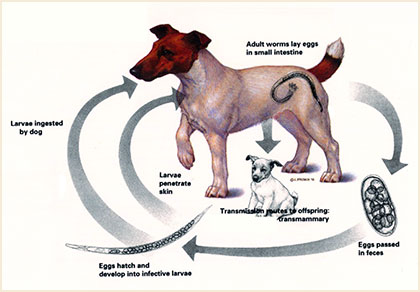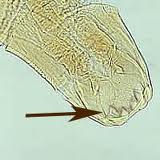Hookworms, or Captain Hook
 Hookworms. I’m not going to lie the first thing I though of was Captain Hook. So I am going to refer to hookworms as Captain Hook today, because it sounds better than “worms” and the mental picture of a crazy pirate is more fun than of nasty little parasites. It’s suspected over 600 million people worldwide are infected by hookworms. When it comes to dogs there are three known species that afflict them. These small, thin worms are about one quarter to one half inch long. They thrive in areas of high humidity and temperature. This provides favorable condition for rapid larvae development and spread. The southern United States is Captain Hook’s favorite place. They feed off and live in the small intestine. They will fasten their mouths to the mucosa, or mucus membrane and suck the blood and tissue fluids from their host. This will cause malnutrition and severe blood loss.
Hookworms. I’m not going to lie the first thing I though of was Captain Hook. So I am going to refer to hookworms as Captain Hook today, because it sounds better than “worms” and the mental picture of a crazy pirate is more fun than of nasty little parasites. It’s suspected over 600 million people worldwide are infected by hookworms. When it comes to dogs there are three known species that afflict them. These small, thin worms are about one quarter to one half inch long. They thrive in areas of high humidity and temperature. This provides favorable condition for rapid larvae development and spread. The southern United States is Captain Hook’s favorite place. They feed off and live in the small intestine. They will fasten their mouths to the mucosa, or mucus membrane and suck the blood and tissue fluids from their host. This will cause malnutrition and severe blood loss.
Captain Hook can infest dogs in almost all of the same ways a dog or puppy can acquire roundworms: prenatal infections through the migration of worms through the placenta, though an infected mother’s milk, digesting the eggs or larvae in the soil, or digesting a dead host animal, such as a rodent. The difference with Captain Hook is that dogs can also become infected through direct penetration of the skin, commonly through the feet pads.
Most serious Captain Hook issues are from the mother’s milk and occur during the first two months of life. You will notice your puppy with bloody or tar black diarrhea. The amount of blood loss in puppies will cause them to get sick quickly and die. You must consult your vet immediately if you’re suspecting Captain Hook as the culprit.
It may be difficult to diagnose an adult dog. It is easy to diagnose the feces when finding the eggs, however the eggs may not show until two or three weeks after infection has began. In this case one must make the diagnosis off clinical signs. These would include tarry or bloody diarrhea, pale mucous membranes caused by anemia, weight loss and progressive weakness. But it is possible that a dog with a serious Captain Hook problem will have no symptoms.
 The most common route of infection in an adult dog will be through the skin. Some of the larvae will encyst or enclose and become a cyst in tissues and other will migrate through the lungs into the intestines and here they will become adults. Within two to three weeks the dog will pass the eggs in his feces. With proper conditions in about 48 hours the eggs will hatch. Now you must care for the environment. Make sure that after your dog has been healed he is in a safe environment where he will not be infected again and go through the whole process over again.
The most common route of infection in an adult dog will be through the skin. Some of the larvae will encyst or enclose and become a cyst in tissues and other will migrate through the lungs into the intestines and here they will become adults. Within two to three weeks the dog will pass the eggs in his feces. With proper conditions in about 48 hours the eggs will hatch. Now you must care for the environment. Make sure that after your dog has been healed he is in a safe environment where he will not be infected again and go through the whole process over again.
After a dog has recovered he will most likely still have encysted larvae in his tissues and it is possible during times of stress or illness these larvae can be released. This will cause a new outbreak of bloody diarrhea and worms will start to once again appear in the intestines
Prevention of Hookworms
Simply being sanitary and having periodic stool checks will prevent a visit from hookworms. You can also use heartworm preventatives such as Interceptor and Heartgard Plus. When it comes to treating the issue there are multiple dewormers you can familiarize yourself with. Drontal Plus, Panacur, Nemex, Telmintic, and Vercom Paste are a few. Be sure to repeat treatment in one to two weeks to make sure you destroy the worms that were previously still in the larval stage. Remember you can always ask your local vet for guidance. When you expect your dog is Captain Hook free double check his feces to make sure you don’t see any signs of infestation. I know no one wants to examine their dog’s poop, but sometime we have to take one for the team. When Captain Hook visits humans he leaves behind and itchy disease called cutaneous larvae. When penetrated into the skin, lumps and streaks beneath the surface of the skin will appear. When it comes to treating humans it will usually clear up on its own. If it doesn’t, consult with your doctor. Captain Hook is a greedy and nasty pirate; lets make sure he stays away from our furry friends!
Other Popular Health Articles
Common Health Problems
Credits Here

